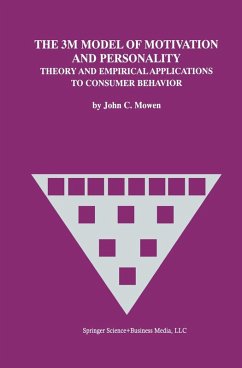
Psychological Ownership and Consumer Behavior (eBook, PDF)
Versandkostenfrei!
Sofort per Download lieferbar
120,95 €
inkl. MwSt.
Weitere Ausgaben:

PAYBACK Punkte
60 °P sammeln!
This pathbreaking volume expands on the construct of psychological ownership, placing it in the contexts of both individual consumer behavior and the wider decision-making of consumer populations. An individual's feeling of ownership toward a target represents the perception that something is "mine!", and is highly relevant to buying and relating to specific goods, economic and health decision-making and, especially salient given today's privacy concerns, psychological ownership of digital content and personal data. Experts analyze the social conditions and cognitive processes concerning share...
This pathbreaking volume expands on the construct of psychological ownership, placing it in the contexts of both individual consumer behavior and the wider decision-making of consumer populations. An individual's feeling of ownership toward a target represents the perception that something is "mine!", and is highly relevant to buying and relating to specific goods, economic and health decision-making and, especially salient given today's privacy concerns, psychological ownership of digital content and personal data. Experts analyze the social conditions and cognitive processes concerning shared consumer experiences and psychological ownership. Contributors also discuss possibilities for socially responsible forms of psychological ownership using examples from environmental causes, and the behavioral mechanisms involved when psychological ownership becomes problematic, as in cases of hoarding.
Included among the topics:
Psychological Ownership and Consumer Behavior pinpoints research topics and real-world issues that will define the field in the coming years. It will be especially useful in graduate classes in marketing, consumer behavior, policy interventions, and business psychology.
Included among the topics:
- Evidence from young children suggesting that even legal ownership is fundamentally psychological.
- Ownership, the extended self, and the extended object.
- Psychological ownership in financial decisions.
- The intersection of ownership and design.
- Can consumers perceive collective psychological ownership of an organization?
- Whose experience is it, anyway? Psychological ownership and enjoyment of shared experiences.
- Psychological ownership as a facilitator of sustainable behaviors including stewardship.
- Future research avenues in psychological ownership.
Psychological Ownership and Consumer Behavior pinpoints research topics and real-world issues that will define the field in the coming years. It will be especially useful in graduate classes in marketing, consumer behavior, policy interventions, and business psychology.
Dieser Download kann aus rechtlichen Gründen nur mit Rechnungsadresse in A, B, BG, CY, CZ, D, DK, EW, E, FIN, F, GR, HR, H, IRL, I, LT, L, LR, M, NL, PL, P, R, S, SLO, SK ausgeliefert werden.












